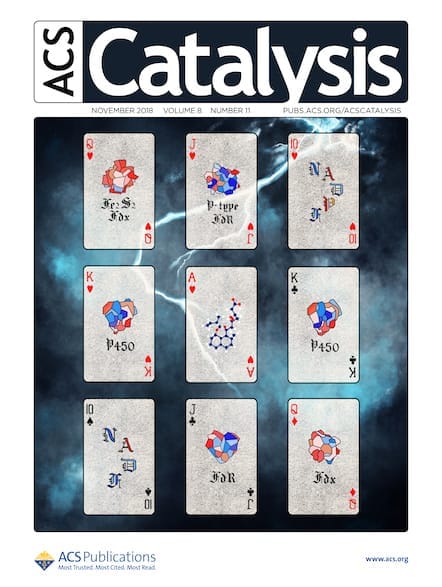ACS Catalysis and the ACS Division of Catalysis Science and Technology are pleased to recognize Professor Shannon S. Stahl of the University of Wisconsin-Madison for developing the copper-catalyzed oxidation of key functional groups including alcohols, amines, and hydrocarbons. His work developing systems that employ oxygen as a terminal oxidant with both Cu and Pd as […]

ACS Catalysis and the ACS Division of Catalysis Science and Technology are pleased to recognize Professor Shannon S. Stahl of the University of Wisconsin-Madison for developing the copper-catalyzed oxidation of key functional groups including alcohols, amines, and hydrocarbons.
His work developing systems that employ oxygen as a terminal oxidant with both Cu and Pd as catalysts has illustrated how careful mechanistic analysis, coupled with insightful catalyst development, can result in ground-breaking synthetic methods.
Recent work from the Stahl group has included the development of Cu-catalyzed oxidation chemistry employing nitroxyl radicals as intermediate oxidants (Angew. Chem. Int. Ed. 2014, 53, 8824). Although Cu-catalyzed methods are notoriously difficult to study, Stahl and co-workers performed detailed studies of these processes and were able to rule out the commonly accepted mechanism, and propose a viable alternative. These insights led to major catalyst improvements, and eventually to one of the most sought-after reactions in catalysis: the ability to catalyze amide bond formation with O2 as the only reagent and water as the only by-product (Angew Chem. Int. Ed. 2019, 58, 12211).
The uptake of Stahl’s methods in industry highlights their relevance. Oxidations of alcohols, again with O2 as the reagent and water as the only by-product, have been published collaboratively with academic and industry partners, illustrating the importance of Stahl’s oxidation catalysis. Industrial process chemistry teams have described scale-up and handling of Stahl’s nitroxyl radical species and together with key academic and industrial researchers, Stahl has published a practical guide to the use of oxygen as a terminal oxidant.
In recent work, the Stahl group has employed these principles in electrochemically-driven oxidations, highlighting the importance of controlling over-potential and the choice of an organic or inorganic mediator (Nature 2016, 535, 406). The principle insights from the team’s research on electrochemical and oxidase processes are now being used by his group in the critically important task of valorizing biopolymers such as lignin (Nature 2014, 515, 249–252).
Stahl carried out his Ph.D. in Chemistry at the California Institute of Technology under the guidance of Professor John Bercaw before moving to the Massachusetts Institute of Technology where Stahl completed an NSF postdoctoral fellowship with Professor Stephen Lippard. He took up an independent position at the University of Wisconsin-Madison in 1999, where he is currently full Professor, and he has held several endowed Professorships. His work has been recognized with the Presidential Green Chemistry Challenge Award, the ACS Award for Affordable Green Chemistry, and the Mitsui Chemicals Catalysis Science award among others.
Stahl’s work has changed how the scientific community thinks about catalytic oxidation chemistry and resulted in multiple, highly useful catalytic processes. We are delighted to recognize these achievements in the awarding of the 2020 ACS Catalysis Lectureship for the Advancement of Catalytic Science. The Division and journal are pleased to honor Stahl at a special symposium at the Fall 2020 ACS National Meeting & Expo in San Francisco in August 2020.
About the ACS Catalysis Lectureship for the Advancement of Catalytic Science
The ACS Catalysis Lectureship for the Advancement of Catalytic Science annually recognizes significant contributions by an individual or a team of researchers to the understanding and/or practice of catalysis. Since 2018, the Lectureship has been awarded on an annual cycle recognizing researchers in three traditional subdisciplines of catalysis:
- Biocatalysis and enzymology, 2018,
- Heterogeneous catalysis, 2019,
- Molecular catalysis, 2020.
While this rotation ensures that significant achievements in all fields will have an opportunity to be recognized, it is noteworthy that the barriers between the subfields continue to be slowly discarded as the broad field of catalysis matures. Marking the 10th year of collaboration between the journal, ACS Catalysis, and ACS Division of Catalysis Science and Technology, 2021 will see the announcement of the 10th Lectureship award winner, with nominations due in November, 2020.
Past Lectureship Winners
2012 – Alan S. Goldman, Rutgers University – article
2013 – John F. Hartwig, Berkeley – article
2014 – Suljo Linic, University of Michigan – article
2015 – R. Morris Bullock, Daniel DuBois, and the Pacific Northwest National Laboratory Hydrogen Catalysis Team – article
2016 – Matthias Beller, University of Rostock, Germany – article
2017 – Paul Chirik, Princeton University –article
2018 – Nicholas Turner, University of Manchester – article
2019 – Maria Flytzani-Stephanopoulos and E. Charles H. Sykes, Tufts University – article
